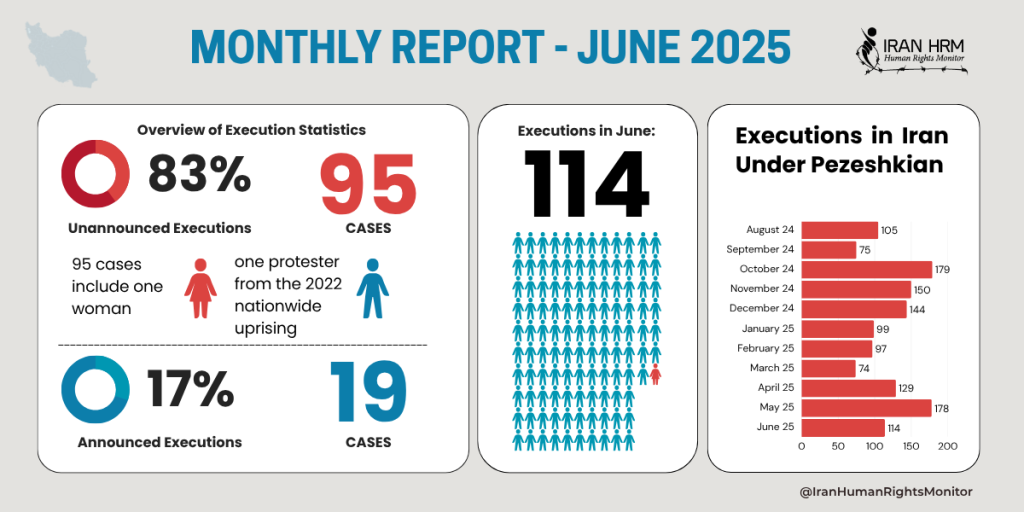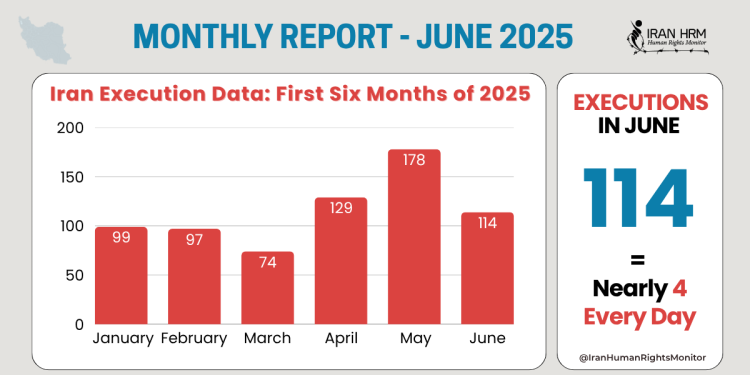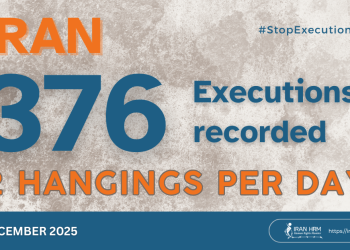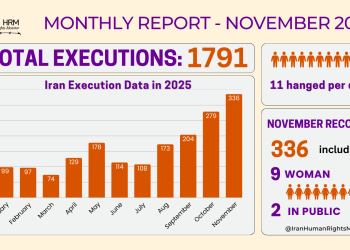The month of June 2025 witnessed a sharp escalation in executions, mass arrests, inhumane prison conditions, and repressive measures targeting political prisoners and minorities in Iran. A total of 114 executions were carried out across the country, 95 of which were unannounced by the authorities. Six individuals were executed on espionage charges, and several acts of violence, torture, and forced disappearances of political prisoners occurred. The Islamic Republic continues its systematic use of the death penalty and arbitrary detention to suppress dissent and instill fear in the population.
Executions in June 2025
The Islamic Republic of Iran carried out a surge in executions during the month of June 2025, further solidifying its position as one of the world’s top executioners. A total of 114 people were executed, marking one of the bloodiest months of the year.
Total Executions: 114
Unannounced by the regime: 95 (including 1 woman)
Officially Announced: 19
Average executions per day: Nearly 4
This wave of executions reflects the regime’s growing reliance on capital punishment as a tool to intimidate the population, silence dissent, and reinforce political control.

Execution of Kurdish Kolbars on Espionage Charges (June 16–25)
Between June 16 and June 25, six individuals were executed on espionage-related charges, including three Kurdish kolbars (border couriers):
On June 25, 2025, Edris Ali, Azad Shojaei, and Rasoul Ahmad Mohammad were hanged in Urmia Prison. All three were arrested in July 2023 and accused of transporting equipment allegedly used in the assassination of nuclear scientist Mohsen Fakhrizadeh.
They were tried and sentenced under vague charges, with no access to a fair trial and no independent legal oversight.
Other Espionage Executions:
June 16: Esmail Fekri – Qezel Hesar Prison
June 22: Majid Mosayebi – Dastgerd Prison
June 23: Mohammadamin Mahdavi Shayesteh – Qezel Hesar Prison
These executions were part of a broader campaign by the regime to frame ethnic minorities and political opponents as foreign agents, often in cases involving fabricated evidence and closed trials.
Mass Execution Spree (June 7–11): 35 Executions in Five Days
Between June 7 and June 11, 2025, Iranian authorities carried out 35 executions in just five days, averaging one execution every 3.5 hours—marking one of the most intense periods of capital punishment recorded this year. Among those executed were Ardeshir Soltanabadi, Masoud Naseri, and Sajad Moradi in Qezel Hesar Prison; Naghi Soufian in Ahar; and Shahin Karami in Ardabil. Mojahed Korkor, a protester from Izeh, was also executed during this period, drawing national and international condemnation. On June 10 alone, 12 prisoners were hanged across Arak, Dastgerd, Zanjan, and Qezel Hesar, including Hafizeh Baluchzehi, a Baluch woman.
This execution spree was part of a broader escalation throughout early and mid-June. From June 1 to June 3, at least 18 executions took place in prisons in Manujan, Urmia, Bam, and Kerman, with victims including Majid Behzadi (Bameri) and Masoumeh Karbakhsh, another female prisoner. Additional executions followed in Tabriz, Taybad, Yasuj, Qom, and Qezel Hesar from June 4 to 6. On June 9, Abdolbaset Shahdadzehi, Abdolsamad Barahouei, Karim Hemmati, and Hamzeh Yari were hanged across Zahedan, Iranshahr, and Karaj. That same week, Rahim Karimi was executed in Qaen, and Saman Mirdoraghi died under torture in the Andimeshk Intelligence Office—further highlighting the regime’s intensified campaign of repression.
Killing of Aydin Shariatmadar
On June 7, Aydin Shariatmadar, a prisoner who had spent 20 years under a death sentence, was shot and killed by prison guards at Imam Ali Hospital in Karaj. Authorities claimed he attempted to escape while hospitalized. Eyewitnesses and inmates dispute this, describing the incident as a deliberate extrajudicial killing.
The killing sparked a protest by fellow inmates in Qezel Hesar Prison’s Unit 3, who chanted “Death or Freedom” in defiance.
Execution of Mojtaba “Mojahed” Korkor Despite Widespread Objections
On Wednesday, June 11, 2025, Iranian state media Mizan, affiliated with the judiciary, confirmed the execution of Abbas Korkori, known as Mojahed Korkor, a protester from Izeh, despite widespread human rights appeals. Korkor was arrested during the nationwide protests in November 2022 and held in Sheiban Prison in Ahvaz. He was accused of “waging war against God” and “corruption on earth” for allegedly participating in an armed attack during a shooting incident in Izeh on November 16, 2022, which resulted in the deaths of seven people, including 9-year-old Kian Pirfalak. These charges have been repeatedly denied by his family and rejected by the Pirfalak family, who have publicly stated that the shooting was carried out by security forces.
Korkor was initially sentenced to death by the Ahvaz Revolutionary Court in April 2023. The Supreme Court overturned the verdict once, but it was reinstated upon retrial. His conviction followed a grossly unfair trial marred by reports of torture and forced confessions. The execution took place on the birthday of Kian Pirfalak, intensifying public outrage and raising renewed concerns over the use of capital punishment as a tool for political repression in Iran.
Executions of Alleged ISIS Members:
On June 9, 2025, Iran’s judiciary announced the execution of nine individuals accused of affiliation with the Islamic State (ISIS) and alleged involvement in “sabotage and terrorist operations” dating back to 2017. The announcement, made through state-controlled media such as Mizan News Agency, offered no details about the identity of those executed, their place of detention, the location of the executions, or the judicial process that led to the implementation of their death sentences.
Mass Arrests on Espionage Charges
In June 2025, the Iranian regime intensified its crackdown through a broad wave of mass arrests, with hundreds of individuals detained under espionage-related and political charges. These arrests were widely publicized by state-affiliated media as part of the regime’s narrative of confronting foreign threats and internal subversion. However, the lack of transparency, due process, and judicial oversight raises serious concerns that these actions are aimed at silencing dissent and instilling fear.
The IRGC-affiliated Fars News Agency reported the detention of 700 individuals allegedly linked to a so-called “espionage network.” The regime claims these individuals were involved in intelligence gathering, propaganda, or cooperation with foreign governments. No names, legal justifications, or evidence were provided. Authorities withheld figures for Tehran Province, suggesting that the true scope of the arrests may be significantly higher than reported.
Provincial Arrest Campaigns
In addition to the IRGC’s mass detentions, other regime entities carried out parallel arrest campaigns:
In Kermanshah Province, the Revolutionary Prosecutor’s Office confirmed 115 arrests. While some individuals were accused of espionage, the majority were detained for allegedly spreading “anti-regime propaganda”—a vague charge frequently used to imprison political and civil activists.
In Fars Province, the Deputy Commander of the State Security Force announced the arrest of 53 individuals for allegedly “disturbing public opinion.” These cases often involve online posts, peaceful demonstrations, or sharing information about executions or political prisoners.
In Isfahan Province, the head of the Cyber Police reported the “identification” of 60 individuals accused of disturbing public opinion through digital platforms. No legal basis for the detentions was disclosed, and no formal charges were published.
Prisoner Transfers and Inhumane Conditions
In June 2025, Iranian authorities carried out a sudden and forceful relocation of numerous political prisoners, further intensifying already inhumane prison conditions. This operation involved the mass transfer of inmates from Evin Prison—one of Iran’s most notorious detention centers—to Greater Tehran Penitentiary (Fashafouyeh), Qarchak Prison, and in some cases Qezel Hesar Prison.
Violent and Coercive Relocation from Evin Prison
On the night of Monday, June 23, 2025, regime authorities abruptly evacuated Wards 4, 7, and 8 of Evin Prison, which housed a large number of political prisoners. The operation was carried out under the pretext of an attack targeting Evin’s administrative section.
Prisoners were forcefully awakened, shackled, and placed on 20 buses without prior notice or explanation. Armed guards supervised the transfer, giving inmates no opportunity to gather their personal belongings, including essential medications. As a result, many prisoners suffering from chronic illnesses were left without treatment, in direct violation of basic humanitarian standards.
Overcrowding and Unsanitary Conditions in Greater Tehran Penitentiary
The male prisoners from Evin were moved to Hall 3, Section 2 of Greater Tehran Penitentiary, a facility known for its overcrowded and substandard conditions. The transferred inmates are now crammed 40 to a room—rooms originally designed for 20 prisoners. Some detainees have been relegated to sleeping in prayer halls or on the floor, with no access to beds or proper ventilation. There is only one functioning bathroom for the entire hall, creating serious health and hygiene concerns.
Many of the relocated inmates are elderly, chronically ill, or otherwise vulnerable. The lack of medical care, coupled with unsanitary conditions, poses a severe risk to their health and safety.
Transfer of Female Political Prisoners to Qarchak Prison
Female inmates were relocated to Qarchak Prison in Varamin, which is widely condemned for its inhumane and degrading conditions, especially for political and ideological prisoners. Qarchak lacks basic facilities, including clean water, sufficient medical care, and proper nutrition. Even before this transfer, the prison was severely overcrowded, and the addition of dozens of new inmates has exacerbated the already dire situation.
Reports indicate that the transferred women have been denied contact with their families, and many have been placed in general wards with inmates convicted of violent crimes, increasing the risk of abuse and mistreatment.
Case of Political Prisoner Ali Younesi
The case of Ali Younesi, a 25-year-old elite student and political prisoner, took a disturbing turn on Wednesday, June 18, 2025, when he was violently assaulted and forcibly disappeared by prison authorities inside Evin Prison. His current whereabouts remain unknown, sparking widespread concern for his safety and wellbeing.
Ali Younesi is a former student at Sharif University of Technology, one of Iran’s most prestigious academic institutions. He gained international recognition after winning a gold medal at the 12th International Olympiad on Astronomy and Astrophysics held in China in 2018. He had previously won silver and gold medals in Iran’s National Astronomy Olympiad, reflecting his extraordinary intellectual talent.
Younesi was arrested on April 10, 2020, in Tehran along with fellow student Amir Hossein Moradi. In a closed and politically motivated trial, both were sentenced to 16 years in prison on vague national security charges, including alleged links to the opposition group People’s Mojahedin Organization of Iran (PMOI/MEK).
The Younesi family has long been subjected to harassment due to their political beliefs and perceived affiliations. Ali’s father, Mir Yousef Younesi, 70 years old, is also imprisoned. He was arrested in December 2022 and had previously endured three years in prison under the Shah and nine years during the 1980s for alleged support of the PMOI/MEK.
In May 2025, after visiting his son in Evin, Mir Yousef Younesi was violently transferred to Ward 7 by prison guards—another act of retaliation against the family.
Judicial Cruelty and Other Human Rights Violations
Amputation Punishments:
On Tuesday, June 10, 2025, the Iranian judiciary carried out the brutal amputation of the hands of two prisoners, in a stark reminder of the regime’s ongoing use of corporal punishment in violation of international human rights norms. The punishment was confirmed by Asadollah Jafari, the head of the Judiciary in Isfahan Province, who described the amputations as part of a routine judicial process.
No names or identifying details of the two amputees were released. As with many such cases in Iran, there is no public evidence that the individuals were granted a fair trial, access to proper legal representation, or opportunities to appeal their sentences. The sentences were executed in secret, and no independent monitoring was allowed to verify the process or assess the prisoners’ conditions.
No to Execution Tuesdays Campaign
Throughout June 2025, the No to Execution Tuesdays campaign—an initiative led by political and ideological prisoners across Iran—continued for the entirety of the month, reaching its 75th consecutive week by the end of June. This sustained act of defiance is a testament to the resilience of prisoners who, despite facing systematic repression, arbitrary sentencing, and harsh prison conditions, continue to protest against the regime’s widespread use of the death penalty.
The campaign remained active in 47 prisons nationwide, including Qarchak Prison, which has now replaced Evin Prison as a central hub of participation following the forced transfer of inmates. Other participating facilities included Greater Tehran Penitentiary (Fashafouyeh), Qezel Hesar, Zahedan, Karaj, Adelabad, Dastgerd, Urmia, and many more across Iran’s provinces.
Conclusion
June 2025 witnessed a sharp escalation in the Islamic Republic of Iran’s use of the death penalty, alongside intensified political repression and widespread abuse in detention centers. The regime’s ongoing disregard for the right to life, due process, and the humane treatment of prisoners highlights the urgent need for a coordinated international response.
Iran Human Rights Monitor calls for immediate global action, including the condemnation of mass executions and inhumane practices in Iranian prisons, the unconditional release of political prisoners such as Ali Younesi, and the dispatch of an independent international fact-finding mission to investigate the conduct of Iran’s judiciary and prison system. Raising public awareness and international advocacy is essential to halt the execution of political and ideological detainees and to hold the Iranian authorities accountable for their systematic human rights violations.







